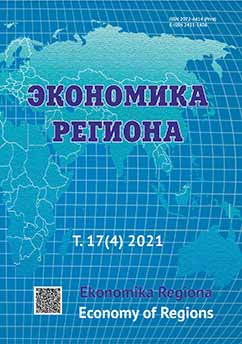Determinants of Foreign Direct Investment in Developed and Developing Countries: Impact of Political Stability
Determinants of Foreign Direct Investment in Developed and Developing Countries: Impact of Political Stability
Author(s): Rogneda I. Vasilyeva, Oleg Svyatoslavovich MarievSubject(s): Economy, Geography, Regional studies
Published by: Институт экономики Уральского отделения Российской академии наук
Keywords: foreign direct investment; political stability; economic development; gravity model; IV PPML; Pseudo Poisson Maximum Likelihood method; principal component analysis; developing economies
Summary/Abstract: Stable political environment and prominent development of political institutions increase foreign direct investment flows by providing lower risks for investors. However, this impact can vary according to the development of the country. This study aims to investigate the impact of various indicators of political stability on foreign direct investment attraction for different economies distinguished by their development level. Our database includes 66 FDI-recipient countries and 98 FDI-investing countries for the period from 2001 to 2018. By applying the gravity approach and Poisson Pseudo Maximum Likelihood method with instrumental variables (IV PPML), we model bilateral FDI flows, incorporating variables reflecting various aspects of political stability formed by the principal components analysis. Interestingly, we found mixed results regarding the impact of political stability on FDI flows. In particular, political stability indicators were found to be insignificant, when analysing the bilateral FDI flows for the group of developed economies. We obtained similar result for the group of developing economies. However, political stability variables significantly influence FDI flows for countries with different development level, confirming the hypothesis that countries’ development affects bilateral FDI flows. Besides, we discover the significant difference between developed and developing countries referring to FDI-investors. Based on the obtained results, we highlight a few policy implications for developing and developed economies.
Journal: Экономика региона
- Issue Year: 17/2021
- Issue No: 4
- Page Range: 1390-1404
- Page Count: 15
- Language: English

